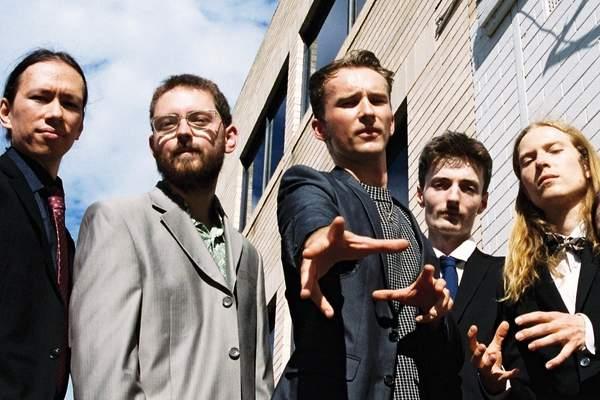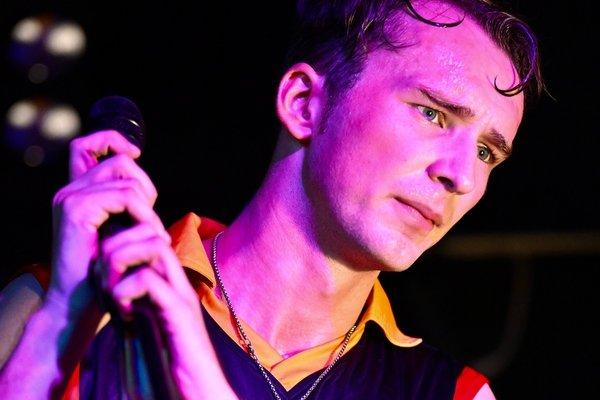As part of Adelaide Cabaret Fringe Festival, Passion Pop Music present 'The Other Team – A Footy Rock Opera'. . . A queer narrative set in the hyper-masculine world of Aussie Rules football.
Footy fanatics Angus and Sharon Lark raised their son, Andy, with dreams of him becoming the greatest player in the sport's history. The fatal glory of the game consumes Andy, who is in the throes of a forbidden, turbulent relationship with the unorthodox captain of the other team – the elusive Shane Fowler.
'The Other Team' is a whirlwind of emotional, high-octane dark comedy (and toe-tapping original songs of lament, ecstasy and grief), exploring the story of Aussie Rules footy – from its inception in the bush to the treacherous history and future of Australia, culminating in the 2050 Grand Final. . . When Andy's love is torn across borders (and guernseys).
Passion Pop Music (Leon, Ben, Shea, Thomas, Reginald, Stella, Jay) bring the tunes in 'The Other Team' to life, through a soundtrack crafted over years and inspired by a number of stories and life experiences.
Here, ahead of the show's presentation at Adelaide Cabaret Fringe Festival, Director/Performer Leon answers some questions.
What inspired you to tell a queer story within such a traditionally hyper-masculine and nationalistic setting?
I grew up in Port Adelaide and was always a non-conforming kid who hated the toxic masculinity which surrounded me at school and when I inevitably attempted club sports. The performative nature of 'ocker' Aussie manliness was emulated so quickly by my classmates and I remained consistently astonished throughout my life at the obsession with violence and hero worship, which sports like rugby and Aussie Rules encouraged in people around me. Now I find these fixations amusing and endearing, since they facilitate a controlled catharsis of our primal urges which – when rules and codes of the field and society are respectfully adhered to – provide a safe and fun way to be wild, so I've come to admire the positive, graceful and extravagant parts of sports in my adulthood. The songs for this show were borne of my experiences with queer love and of my own journey exploring my masculine identity, and footy provided a perfect backdrop and fertile ground for drama and metaphor regarding the psychosexual content which my songs are inadvertently steeped in. Because the songs have been written over so many years, they've been inspired by a multitude of stories and experiences – but overall the tone of the story took heavy influence from the poetry and life story of Yukio Mishima (look him up on the internet if you aren't familiar). Nationalism and sport have always been closely linked, so I thought there was an interesting intersection of all these themes to explore while functioning as a vehicle for my message about burgeoning fascism in Australian and the absolute crime that as of 16 May 2025, Australian Rules Football is the only major sporting code in the world with no openly gay players in the men's league.
The show spans from the origins of AFL to a speculative future, landing at a Grand Final in 2050. What does that timeline allow you to explore in terms of history, politics and cultural identity in Australia?
Speculative fiction is handy since it permits satire of past events or current events with legal impunity, but I knew I wanted to write a show set in a post-separatist Australia because of how outrageous and also pertinent an idea it would be. In the age of rising political extremism, it isn't a far-fetched notion that the people of WA could elect a Premier who was staunchly in support of their separation from the Commonwealth. After all, the proportion of people who voted 'yes' in the 1999 Australian Republic referendum was higher than that for the recent vote for an Indigenous Voice to Parliament. A timeline and political circumstance such as this allows me as an author to interrogate the elephant in the room, which is Australia's broken and confused identity. I don't think this has previously been or is currently explored enough in our art, and I believe that's because the Australian identity is in a neurotic battle with itself at all levels of power and in all political factions. We are a nation of orphans living in the aftermath of a genocide, and many of us are constantly faced with the challenge of accepting that we still actually live here despite the hostility of this landscape to our way of life.

Passion Pop Music
Andy and Shane’s relationship sits at the centre of the show. How did you approach building that emotional dynamic between two characters positioned on opposing sides?
Forbidden love is a fixture in history and story-telling – it has been and always will be compelling. Who doesn't love a sneaky link.
'The Other Team' blends rock opera, satire and cabaret. How do those elements help you tell the story, especially when dealing with themes of repression, desire and division?
Those are the best, and my preferred, media for exploring a story which is both deeply personal yet heavily ironic, given the current cultural atmosphere and the resources available to me. All new works, to me, should be a step forward – but in the information age, we are all so saturated in stories that nothing can be created without association to another creative work or historic event. 'Cabaret' is a funny show about the most horrific subject matter of the 20th century, 'Rocky Horror' is a pastiche but an iconic work unto itself and 'Company' is a transgressive step towards sophistication abandoning the scale and theatrics of previous musicals. They are in direct dialogue with the stories which inspired them, and exist as the antithesis to the prevailing cultural attitudes of the previous generation. On the subject of satire, my friend Gabe Bath explores in his excellent film 'The Ships That Bear' that as consumers and creators of Western media, we have been living in a cultural loop of increasingly distorted retellings of the same stories since the 1960s – all stemming from a few crucial events which happened in the mid 20th century. Though I am more influenced by mid-century works like those I've mentioned, it is interesting to consider that since 'Rent', musical theatre audiences have grown tired of camp aesthetics and have eagerly embraced the medium's story-telling power more than ever with shows like 'Wicked', 'Hamilton' and 'Hadestown'. My favourite show is Sean Nicholas Savage's 'Please Thrill Me', which is what encouraged me to explore music theatre in the first place. It has this totally unique tone of self-parody which is completely offset by how disarmingly beautiful the music and poetry is. When I write songs for 'The Other Team', I always have that feeling front and centre in my mind from when I first watched 'Please Thrill Me'. All of these works couldn't exist without music, because of how emotional the themes are – and how music (particularly opera) permits the unabashed expression of passion which such dramatic themes demand.
For queer audiences, this show presents something quite rare: a deeply queer narrative set within a very Australian cultural framework. Was that a conscious choice, and what do you hope LGBTQIA+ audiences take from it?
This show is indeed a proudly queer narrative depicting a gay age-gap relationship front and centre. This was both a conscious and subconscious choice, since I'd been interested in exploring this dynamic in my work for many years, and I had been fascinated by stories I'd observed in the setting of Aussie Rules football. I believe that visibility is the key to euphoria, and I am interested in expressing the magnitude of feeling from and the ubiquity of relationships like this. I hope that the audiences, in particular LGBTQIA+ and footy-loving audiences, are moved by this work and appreciate the social commentary.
How do you manage transitions/shifts in tone with this show, and keep the emotional core intact?
Comic relief is called relief for a reason, and I find that a dark sense of humour allows you to acknowledge harsh realities in a refreshing way – so this hasn't been a difficult process. Performing is inherently bizarre and I would find it unnatural to write something which was totally serious without humour or vice versa.
You’re presenting this as part of Adelaide Cabaret Fringe Festival – a space known for pushing boundaries and spotlighting independent voices. What does it mean to you to bring 'The Other Team' to this kind of platform?
They have been very supportive of the grassroots arts movement in my community. People had told me that this show was a perfect fit, so it was a no-brainer.
The work is being performed by Passion Pop Music, a group that’s gained a bit of a reputation for blending poetry, performance and provocation. How would you say 'The Other Team' builds on the legacy of your Leonard Cohen cabaret show, 'Death Of An Adelaidies Man'?
I don't know how you've got such an accurate idea of our reputation from NSW, but you're bang on. This show was written following a period of songwriting for a year or so with my good friend and keyboardist Ben Anderson, with whom I formed a band called The Awful Truth to rival my bandmate and friend Tim's original noise-rock band CHOP (Concerned Home-Owners Prospect) which had formed during our tenure as a Leonard Cohen cover band. It was frankly a creative humiliation to maintain a show like the 'Death Of An Adelaidies Man' outside of the festival season, but at least I'd learnt a little about arrangement and performance while also meeting some killer jazz musicians – enabling me to put together a show like this. Inadvertently, both shows explore queer themes and mortality, but that's just what I find myself writing about. Unless it's a sequel, I don't think I make a conscious effort to build on previous works. Usually I am too concerned with creating something more interesting and different.

There’s something powerful about telling queer stories that are unapologetically complex and uniquely local. How important is it to you to create work that reflects both queerness and Australian identity, in all their contradictions?
Contradictions are the spice of life, and conveniently, they're everywhere! You write what you know, and this is what I know. I am very grateful that I'm not compelled to write a slasher movie at this point in my life.
Finally, what’s your hope for audiences who come to see 'The Other Team'? Whether they’re die-hard footy fans or total outsiders, what do you want them to walk away thinking or feeling?
Life is like a Sherrin, you never know where it's going to go. You also shouldn't give up before the game is over.
'The Other Team – A Footy Rock Opera' plays Main Stage @ Arthur Art Bar (Adelaide Cabaret Fringe Festival) 29 May.
This story originally appeared on our queer sister site, FROOTY.

